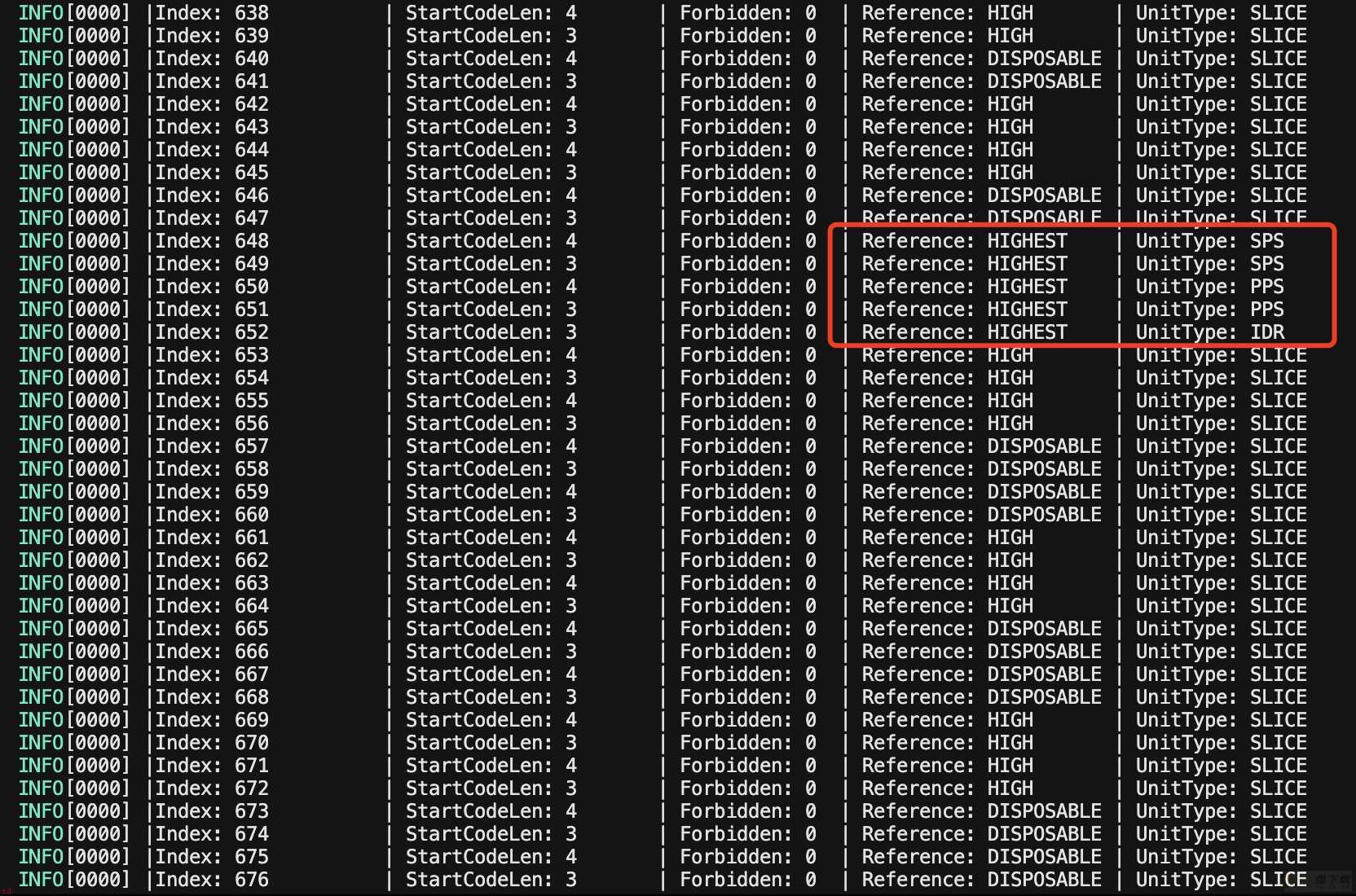H264码流NALU解析
作者:快盘下载 人气:59
包
package h264 import ( ;sync; log ;github.com/sirupsen/logrus; ) const ( DEFAULT_CAP int = 1024 * 1024 * 4 // NALU类型 NALU_TYPE_SLICE = 1 NALU_TYPE_DPA = 2 NALU_TYPE_DPB = 3 NALU_TYPE_DPC = 4 NALU_TYPE_IDR = 5 NALU_TYPE_SEI = 6 NALU_TYPE_SPS = 7 NALU_TYPE_PPS = 8 NALU_TYPE_AUD = 9 NALU_TYPE_EOSEQ = 10 NALU_TYPE_EOSTREAM = 11 NALU_TYPE_FILL = 12 // 优先级 NALU_PRIORITY_DISPOSABLE = 0 NALU_PRIRITY_LOW = 1 NALU_PRIORITY_HIGH = 2 NALU_PRIORITY_HIGHEST = 3 ) type NaluHead struct { StartCodeLen int Forbidden int Reference int UnitType int } type H264Buffer struct { mutex sync.Mutex data []byte dataMaxSize int rPtr int naluHeads []*NaluHead // NALU块信息 iFrameIndex []int // I帧索引列表 } func NewH264Buffer(cap int) *H264Buffer { return &H264Buffer{ data: make([]byte, 0, cap), dataMaxSize: cap, rPtr: 0, naluHeads: make([]*NaluHead, 0), iFrameIndex: make([]int, 0), } } func (buf *H264Buffer) Push(d []byte) { buf.mutex.Lock() defer buf.mutex.Unlock() log.Info(;H264Buffer push data;) if len(d) > buf.dataMaxSize { return } // 计算超出的字节数 over := len(buf.data) ; len(d) - buf.dataMaxSize if over > 0 { // 左移超出的字节数 buf.data = buf.data[over:] buf.rPtr = buf.rPtr - over } buf.data = append(buf.data, d...) // 更新nalu信息 buf.updateNALU() log.Info(;I frame indexs: ;, buf.iFrameIndex) } func (buf *H264Buffer) getNALUHead(headIdx int) *NaluHead { return &NaluHead{ Forbidden: int(buf.data[headIdx] >> 7), Reference: int((buf.data[headIdx] << 1) >> 6), UnitType: int((buf.data[headIdx] << 3) >> 3), } } func (buf *H264Buffer) updateNALU() { buf.naluHeads = make([]*NaluHead, 0) buf.iFrameIndex = make([]int, 0) for i := 0; i < len(buf.data)-5; i;; { if buf.data[i] == 0 && buf.data[i;1] == 0 { if buf.data[i;2] == 1 { head := buf.getNALUHead(i ; 3) head.StartCodeLen = 3 // 起始码长度为3的情况 buf.naluHeads = append(buf.naluHeads, head) if head.UnitType == NALU_TYPE_IDR { buf.iFrameIndex = append(buf.iFrameIndex, i) } } if buf.data[i;2] == 0 && buf.data[i;3] == 1 { head := buf.getNALUHead(i ; 4) head.StartCodeLen = 4 // 起始码长度为4的情况 buf.naluHeads = append(buf.naluHeads, head) if head.UnitType == NALU_TYPE_IDR { buf.iFrameIndex = append(buf.iFrameIndex, i) } } } } } func (buf *H264Buffer) NaluInfo() { buf.mutex.Lock() defer buf.mutex.Unlock() log.Info(;|Index | Forbidden | Reference | UnitType|;) for i, v := range buf.naluHeads { reference := ;UNKNOW; switch v.Reference { case NALU_PRIORITY_DISPOSABLE: reference = ;DISPOSABLE; case NALU_PRIRITY_LOW: reference = ;LOW; case NALU_PRIORITY_HIGH: reference = ;HIGH; case NALU_PRIORITY_HIGHEST: reference = ;HIGHEST; } naluType := ;UNKNOW; switch v.UnitType { case NALU_TYPE_SLICE: naluType = ;SLICE; case NALU_TYPE_DPA: naluType = ;DPA; case NALU_TYPE_DPB: naluType = ;DPB; case NALU_TYPE_DPC: naluType = ;DPC; case NALU_TYPE_IDR: naluType = ;IDR; case NALU_TYPE_SEI: naluType = ;SEI; case NALU_TYPE_SPS: naluType = ;SPS; case NALU_TYPE_PPS: naluType = ;PPS; case NALU_TYPE_AUD: naluType = ;AUD; case NALU_TYPE_EOSEQ: naluType = ;EOSEQ; case NALU_TYPE_EOSTREAM: naluType = ;EOSTREAM; case NALU_TYPE_FILL: naluType = ;FILL; } log.Info(;|Index: ;, i, ; | StartCodeLen: ;, v.StartCodeLen, ; | Forbidden: ;, v.Forbidden, ; | Reference: ;, reference, ; | UnitType: ;, naluType) } } func (buf *H264Buffer) Pop() []byte { buf.mutex.Lock() defer buf.mutex.Unlock() d := buf.data[buf.rPtr:] buf.rPtr = len(buf.data) - 1 return d } func (buf *H264Buffer) PopLastGOP() []byte { buf.mutex.Lock() defer buf.mutex.Unlock() if len(buf.iFrameIndex) == 0 { log.Info(;no I Frame;) return make([]byte, 0) } idx := buf.iFrameIndex[len(buf.iFrameIndex)-1] d := buf.data[idx:] log.Info(;GOP size: ;, len(d)) return d }
测试代码
func main() { d, err := ioutil.ReadFile(;sintel.h264;) if err != nil { log.Fatal(err) } buffer := h264.NewH264Buffer(h264.DEFAULT_CAP) buffer.Push(d) buffer.NaluInfo() }
加载全部内容